Yes, Sesame Seeds Are That Good for You— and These Are Their Top Nutritional Perks
Permission to eat everything bagel seasoning at every meal.
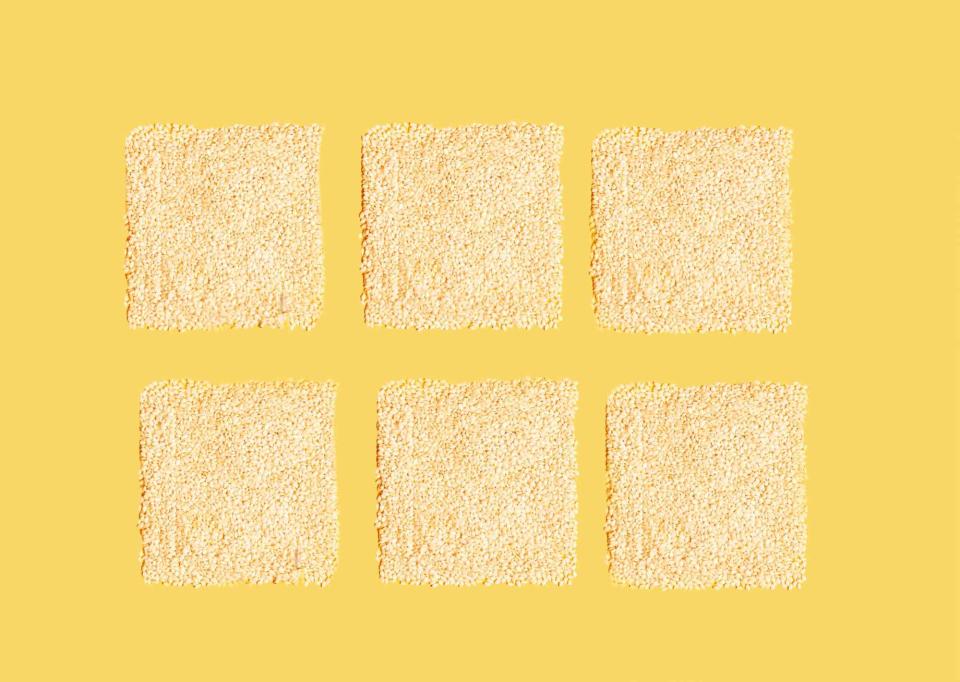
You’ll be hard-pressed to find a cultural cuisine that doesn’t feature sesame seeds in at least one dish. These tiny pops of nutty flavor and texture can be found in Asian, African, Latin American, and Middle Eastern dishes, just to name a few. But did you know that the sesame seed is an illustrious superfood and one of the healthiest seeds you can eat? That’s right, beyond being an incredible flavoring agent, these seeds are packed to the brim with nutrition that can translate to serious health benefits for everyone who eats them.
Related:Eat Your Chia Seeds for Gut-Friendly Fiber, Healthy Fats, and Antioxidants
History of Sesame Seeds
Sesame seeds come from the Sesamum indicum, a bushy green annual plant, reminiscent of overgrown basil, that produces beautiful tubular flowers in addition to its tasty tear-drop-shaped seeds. This oil seed has a long standing, rich history. The oldest traces of sesame were found in what is now the Indus Valley in Pakistan 4,000–6,000 years ago and have been an international culinary staple since, having particular significance in Chinese cuisine over the centuries.
Sesamum indicum linn, the scientific name for these seeds, come in a variety of colors including white, beige, brown, red, and jet black. You can expect a mild, nutty flavor from them with hints of earthiness that lends nicely to both savory and sweet dishes. Sesame seeds can also serve as a unique textural element, offering the perfect subtle crunch to your recipes.
Related:5 Health Benefits of Flaxseeds—the Small-but-Mighty Superfood
Sesame Seeds Nutrition and Health Benefits
You may be happily surprised to discover just how much nutritional value sesame seeds offer, especially given their tiny size. Here are a few of their top health benefits to know.
They're packed with protein and vitamin B for energy.
In sesame seeds, you’ll find both protein and B vitamins that together will offer a serious kick of energy. Three tablespoons of sesame seeds contain 5 grams of protein as well as impressive amounts of the B vitamins thiamin, niacin, vitamin B6, and folate. In addition to providing energy, protein helps the body maintain and build healthy tissues, including muscle. As a pivotal player in energy metabolism throughout the body, B vitamins also support healthy energy levels.
They support healthy digestion and gut microbiome.
When it comes to healthy eating for gut health, sesame seeds are majorly beneficial. They’re loaded with fiber, both the soluble and insoluble varieties. These types of fiber help maintain digestive regularity while addressing concerns like diarrhea and constipation. Plus, soluble fiber feeds our healthy bacteria in the gut microbiome, helping to not only improve digestive health, but whole-body health as well.
Related:16 Best Fruits and Vegetables For Gut Health, According to RDs
They help boost immunity.
These oilseeds will also help to keep your immune system function on point, thanks to the zinc, vitamin E, and plant compounds they contain. Zinc is a mineral well-known for its ability to bolster the immune response, while vitamin E is a fat-soluble vitamin that serves as an antioxidant, reducing inflammation and fighting off disease-causing free radicals. On the plant compound front, these seeds are especially high in lignans, phytosterols, and flavonols. In sesame, you’ll also uniquely find the lignan compounds sesamol, sesamin, and sesamolin. A review of the evidence published in Molecules found these lignans to have antioxidant, anti-inflammatory, and even anti-cancer properties, while also supporting blood sugar regulation and slowing the process of aging. All of these nutrients combine to make sesame an exceptional immune-boosting food.
They're extremely good for heart health.
Many of the nutritional components you’ll find in sesame seeds—namely healthy fats, fiber, magnesium, and vitamin E—combine to make them an excellent heart-healthy food choice. These little beauties aren’t called oilseeds for nothing: In fact, 60 percent of their composition is oil—and heart-healthy oil at that.
Sesame seeds primarily offer unsaturated fat, which is considered to be a heart-healthy fat, as it can improve blood cholesterol levels while reducing inflammation. The fiber they contain also helps to lower cholesterol in the body, high levels of which can be a main contributor to heart disease. Meanwhile the magnesium and vitamin E in sesame seeds work to reduce blood pressure, another key piece to the puzzle of cardiovascular illness. The data backs this up, with one review finding sesame consumption to be associated with improved blood lipid (including cholesterol) levels as well as blood pressure levels.
They support bone and joint health.
Sesame seeds can even work to support optimal bone and joint health. When looking at bone health, sesame offers phosphorus and magnesium, both minerals that play a vital role in bone formation. And in terms of joints, studies show that sesame can actually encourage chondrocyte formation. Chondrocytes are the structural components of cartilage, the connective tissue that protects our joints. This means that these seeds may have the capacity to offer therapeutic benefits for those with osteoarthritis.
They deliver an abundance of beneficial minerals.
In addition to all the aforementioned nutrients sesame seeds provide, they also contain notable amounts of manganese, iron, copper, and selenium. These minerals work to help form hormones, connective tissues, nerves, and red blood cells, while also preventing DNA damage and supporting healthy thyroid function.
Black Sesame Seeds vs. White Sesame Seeds
One thing to note is that black sesame seeds will take all of the nutrition of white sesame seeds to the next level. Black and white sesame seeds are from the same plant, so their health benefits will be the same, for the most part. White sesame seeds are actually the product of removing the black outer shell (or hull) from black sesame seeds, similar to the process of creating refined grains. Because black sesame seeds maintain their hulls, they offer enhanced nutrition through even higher levels of plant compounds, vitamins, and minerals.
How to Eat More Sesame Seeds
Whether you use black sesame seeds, their classic white counterpart, or any of the other varieties, there are so many tasty ways to use them in the kitchen. Typically you’ll find sesame in the forms of the seeds, sesame oil, or tahini (pulverized sesame seeds) in the grocery store. While sesame oil is quite pungent and best utilized as a finishing or flavoring agent in dishes (versus an oil to cook with), the seeds and tahini have endless possibilities. These are perfect additions to dressings, sauces, and baked goods. The seeds are also delicious in stir-fries, vegetable dishes, hot cereals, granola, yogurt, smoothies, breading for proteins, and salads. Hot tip: Toast your sesame seeds prior to use—this intensifies their flavor and will take your culinary creations to the next level.
And beyond being a classic ingredient in hummus, tahini can also serve as a tasty swap-out for almost any nut butter in nearly any application. Look for tahini brands with as few ingredients as possible to get the most nutrition out of this creamy, nutty, nutritious spread.
As if the flavor of sesame wasn’t enticing enough, these teeny seeds are top-tier superfoods, offering so many impressive health benefits. Through including them in your healthy routine, you can be sure to reap all these amazing benefits in the most delicious way possible.
Below, check out some of our favorite recipes starring sesame seeds.
Easy, Healthy Sesame Seed Recipes
Sesame-Crusted Tofu With Spicy Dipping Sauce
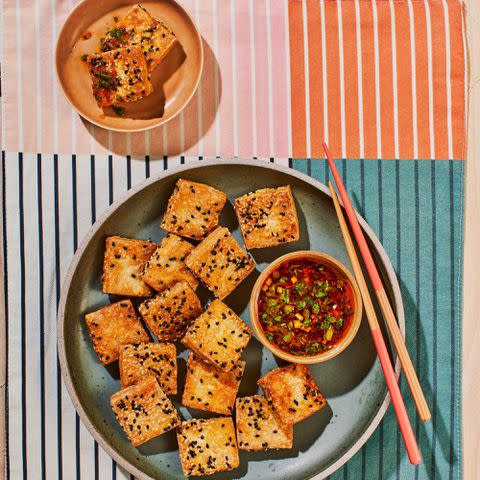
Miso-Mushroom Ramen With Jammy Eggs
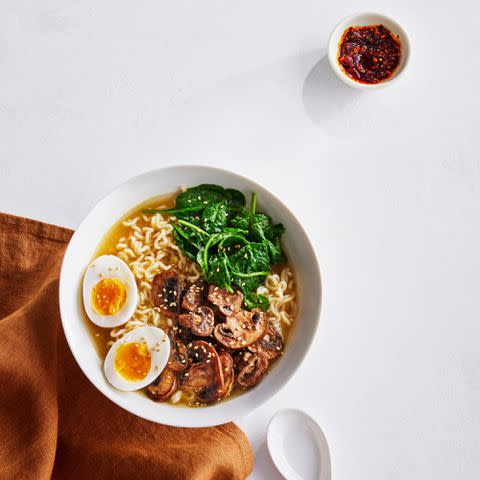
Everything-Seasoned Cream Cheese Scones
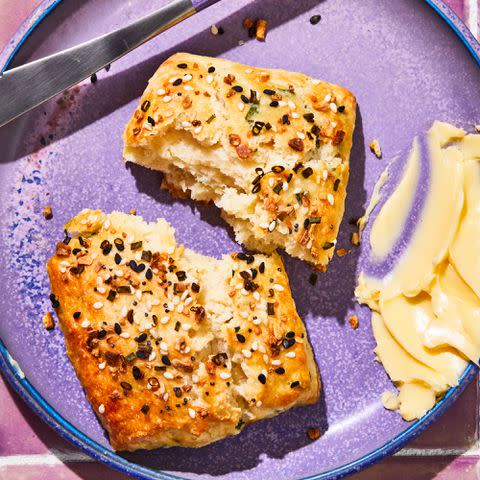
Coffee-Tahini Smoothie
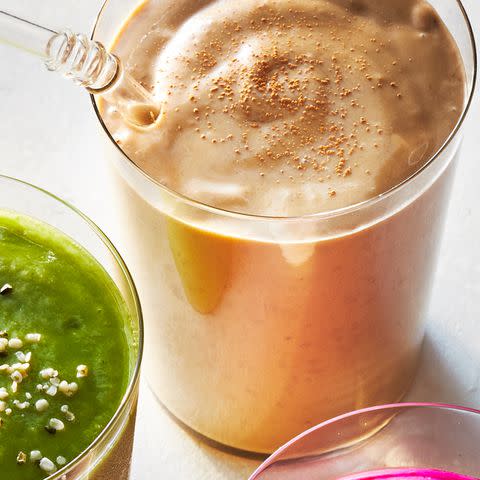
Sesame-Ginger Potato Salad

Everything Salmon Skewers With Sriracha Aioli
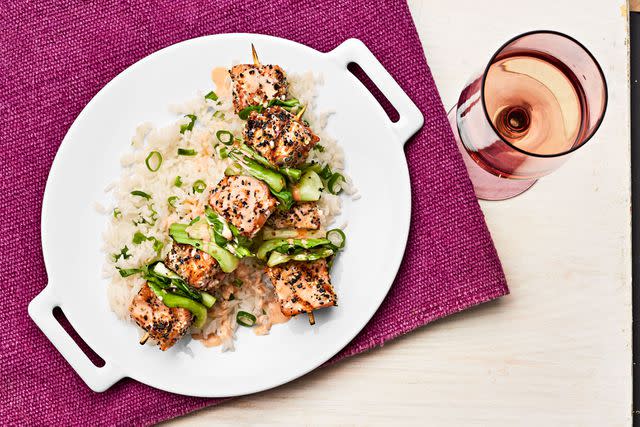
Victor Protasio
For more Real Simple news, make sure to sign up for our newsletter!
Read the original article on Real Simple.

